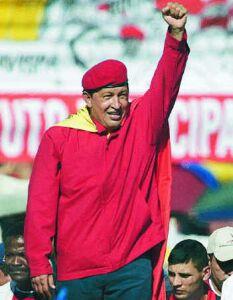Massive participation delays results in Venezuela’s recall vote
 Massive participation delays results in Venezuela’s recall vote
Massive participation delays results in Venezuela’s recall vote
Venezuelan’s made long lines until midnight to attend to the poll stations on Sunday to decide whether Chavez will remain in power or should call to premature elections in 30 days. Three were killed in confusing episodes presumabily not politically instigated.
In the first ever recall vote in Latin American history, Venezuelan’s massively attended to polls on Sunday to decide over the future of the constitutional President Hugo Chavez. Preliminary reports say that the outstanding and unexpected level of participation could boost opposition chances to force Chavez to call on new presidential elections in 30 days, but no official results were given as the electoral agency had to extend voting time until midnight local time.
Late in the night, Chavez’s foes and supporters filled the streets proclaiming victory to their side. During the day, three people were killed in confusing episodes presumably not related with politics, according to sources from both sides.
Activists on both sides set off fireworks and blared recordings of bugle music to wake voters hours before dawn, hoping for a flood of early votes in their favor. With army soldiers looking on, thousands lined up at polls before they opened at 6:00 a.m. as many stood there until midnight as the new electronic system tightened controls to avoid any sort of fraud.
Officials from around the world - including Pope John Paul II and U.S. Secretary of State Colin Powell - have called the referendum a victory for democracy in a nation battered by months of upheaval. Chavez - has seen a resurgence of support among the poor after spending lavishly on far-reaching social programs - has pledged to respect the results "no matter what they are", calling the referendum "a victory for the people, for democracy."
To oust Chavez, the opposition needs at least 3.6 million votes –the same amount Chavez obtained when reelected in 2000-, and surpass the votes in support of the President. If that is the case, Chavez would be automatically dismissed and the power would rely on country’s vice-President, Jose Rangel, who should call to new elections for president in 30 days.
The constitution is unclear on whether Chavez could run as a candidate if a new election is held, as he has said he would do. The opposition coalition has yet to name a potential candidate.
Hernan Etchaleco
Subscribe to Pravda.Ru Telegram channel, Facebook, RSS!




